SPECIAL REPORT
1st of 2 parts
TAMPAKAN, South Cotabato (MindaNews / 22 Jan) – At a sari-sari store nestled deep in the mountains that host Southeast Asia’s largest untapped copper and gold minefield, members of the B’laan indigenous community belt out songs to the accompaniment of a videoke machine at noon, as fog continues to blanket this erstwhile sleepy mountain village.
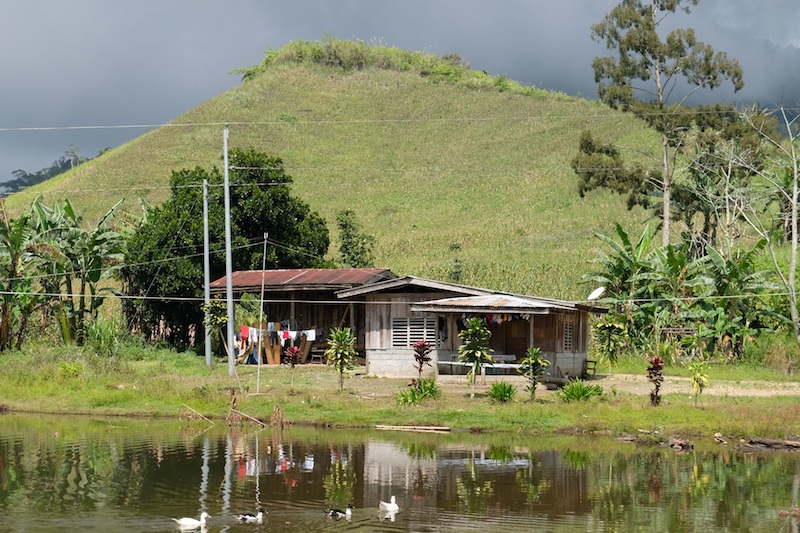 Power lines supply electricity to residents within the Tampakan project in this photo taken on January 16, 2020. MindaNews photo by BONG S. SARMIENTO
Power lines supply electricity to residents within the Tampakan project in this photo taken on January 16, 2020. MindaNews photo by BONG S. SARMIENTO
Not far from the store, several B’laan women and children are glued to a television set watching a noontime show in a house made of wood in the enclave known as Bong Mal district.
Bong Mal, which means “big tarsier” in B’laan, is a restive community within the Tampakan project, where more than a dozen pro- and anti-mining supporters have been killed.
On the way up to the mountains of Sitio Alyong in Bong Mal, passing through several B’laan communities, the road has been repaired since last year, and some parts traversed by creeks are already connected by bridges.
Sagittarius Mines, Inc. (SMI), the developer of the Tampakan project, poured at least P103 million for the road rehabilitation spanning 17.4 kilometers in Barangays Danlag (6.7 km) and Tablu (10.7 km) since 2018, according to a company report late last year.
SMI is the holder of the Financial Technical Agreement (FTAA) which is supposed to expire on March 21, 2020 but was extended for another 12 years, in an order dated June 8, 2016, according to the three-page document obtained by MindaNews from the Mines and Geosciences Bureau-Region 12 (MGB-12). (See extension story)
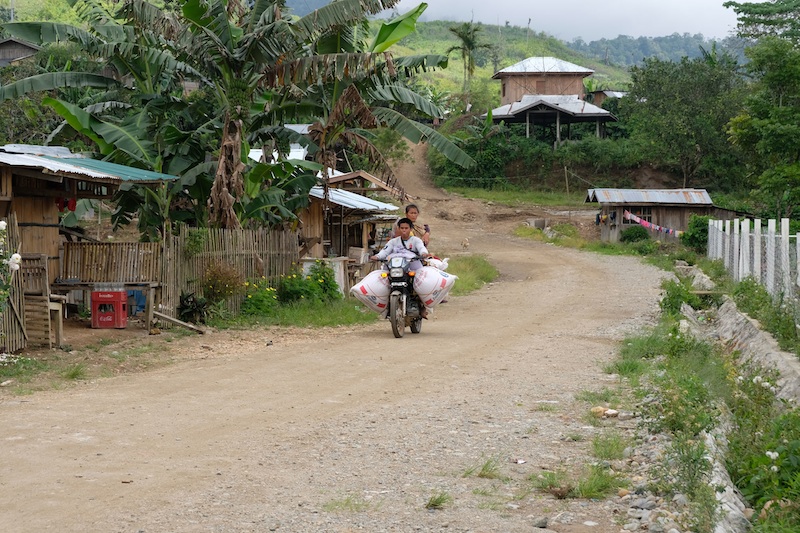 Residents within the Tampakan project transport their corn harvest down to the markets in Tampakan, South Cotabato on January 16, 2020. MindaNews photo by BONG S. SARMIENTO
Residents within the Tampakan project transport their corn harvest down to the markets in Tampakan, South Cotabato on January 16, 2020. MindaNews photo by BONG S. SARMIENTO
The public was unaware that such an order was issued. The Diocese of Marbel, which is among those opposing the Tampakan project, learned about it only a few days ago.
Felizardo Gacad, Jr., MGB-12 director, told MindaNews on January 20 that the 12-year extension will be reckoned from the expiration of the original FTAA on March 21, 2020, or until March 21, 2032.
He added the company has the option to renew the FTAA for another 25 years, and if granted, SMI can operate until 2057.
Bulk of deposits
The bulk of the copper and gold deposits of the Tampakan project is in the villages of Pulabato, Danlag and Tablu, all in this town. The project site also covers the barangays of Kimlawis in Kiblawan, Davao del Sur province and Datal Blao in Columbio, Sultan Kudarat province.
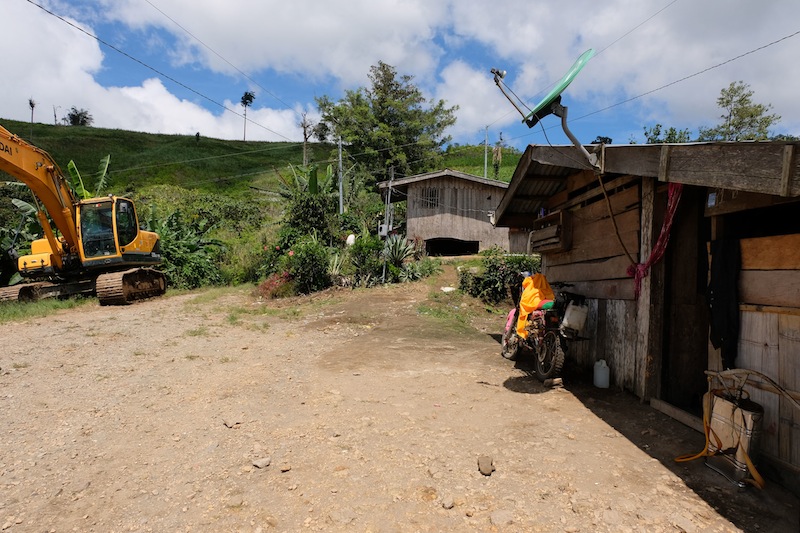 Electricity supply allows residents within the Tampakan project to watch television or movies in this photo taken on January 16, 2020. MindaNews photo by BONG S. SARMIENTO
Electricity supply allows residents within the Tampakan project to watch television or movies in this photo taken on January 16, 2020. MindaNews photo by BONG S. SARMIENTO
Canals and gabions have also been provided as part of the road rehabilitation project in this second-class municipality with a population of almost 40,000 based on the 2015 census.
On a slope near the SMI basecamp in this town’s Barangay Tablu on January 16, MindaNews saw workers putting in place soil erosion blankets made from coconut husks.
Power lines and the road projects in the Tampakan mining site have been providing the B’laans, the Indigenous Peoples (IP) in the area, with economic and entertainment relief as improved road conditions now make it easier to transport their agricultural crops, mostly corn, and electricity has allowed them to belt out songs using their videoke machines and watch television shows, teleseryes and movies after working in their farms.
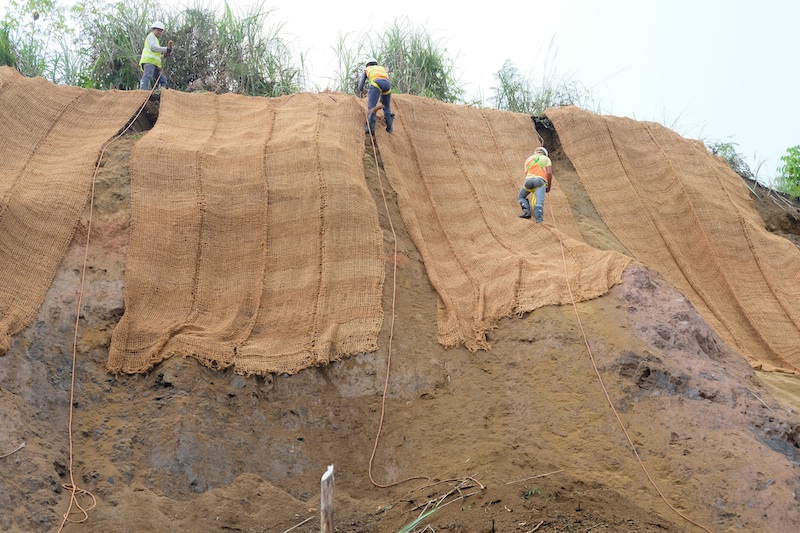 Workers put in place soil erosion blankets made from coconut husks within the Tampakan project area in Barangay Tablu, Tampakan, South Cotabato on January 16, 2020. MindaNews photo by BONG S. SARMIENTO
Workers put in place soil erosion blankets made from coconut husks within the Tampakan project area in Barangay Tablu, Tampakan, South Cotabato on January 16, 2020. MindaNews photo by BONG S. SARMIENTO
Before 2016, electricity was not available in communities that will be directly affected by the long-delayed US$5.9 billion Tampakan project whose deposits were discovered in the mid-1980s.
Since January 11, MindaNews sought SMI for interviews for this story but as of January 21, SMI had not responded to the calls, text messages and even visits to the company’s administrative office along the national highway in Polomolok, South Cotabato and the basecamp in Barangay Tablu in Tampakan town.
Start in three years
But Tampakan Mayor Leonard Escobillo told MindaNews that SMI targets to start mining operations probably in three years if it is able to acquire the needed permits from the concerned government agencies, including the Department of Environment and Natural Resources (DENR) and the National Commission on Indigenous Peoples (NCIP).
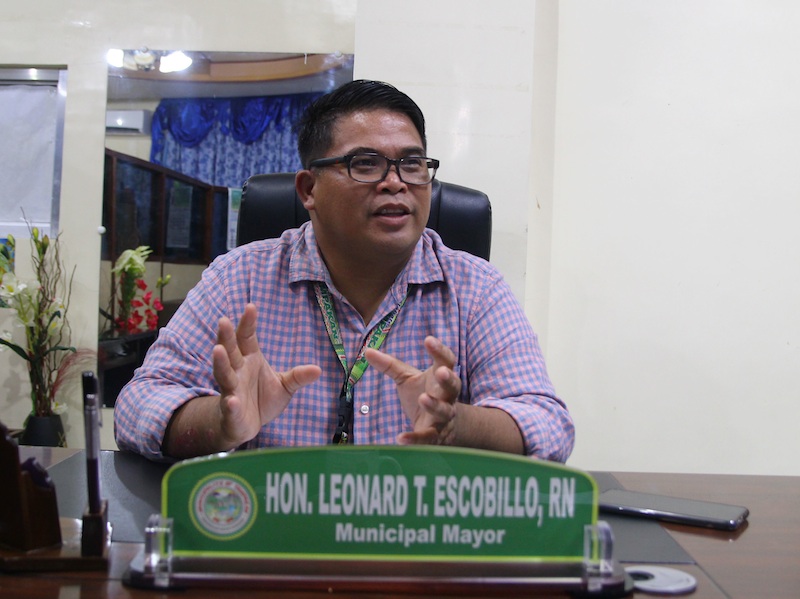 Nurse Leonard Escobillo, mayor of Tampakan, South Cotabato. MindaNews photo by GREGORIO C. BUENO
Nurse Leonard Escobillo, mayor of Tampakan, South Cotabato. MindaNews photo by GREGORIO C. BUENO
The NCIP needs to issue the Certification Precondition, the document attesting that the concerned communities have granted their free, prior and informed consent (FPIC) to the project. On the other hand, DENR, through its Environmental Management Bureau, issues the environmental compliance certificate (ECC) to projects such as SMI’s.
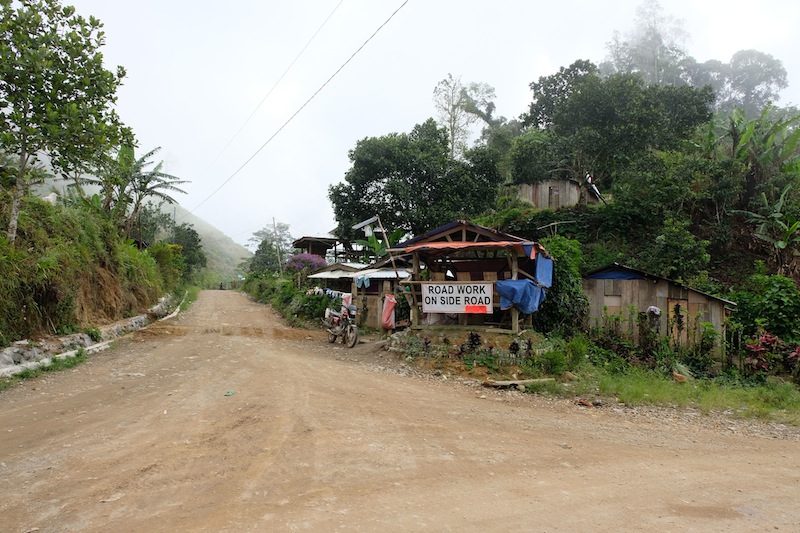 Road repairs funded by Sagittarius Mines, Inc benefit Sitio Kampo Sinko, Barangay Danlag in Tampakan, South Cotabato as seen in this photo taken on January 16, 2020. MindaNews photo by BONG S. SARMIENTO
Road repairs funded by Sagittarius Mines, Inc benefit Sitio Kampo Sinko, Barangay Danlag in Tampakan, South Cotabato as seen in this photo taken on January 16, 2020. MindaNews photo by BONG S. SARMIENTO
The late Environment Secretary Gina Lopez cancelled the Tampakan project’s ECC in 2017 “due to environmental and social concerns.”
The mines development site straddles five tribal councils in five barangays under three towns (Tampakan in South Cotabato, Kiblawan in Davao del Sur and Columbio in Sultan Kudarat), all of which have expressed support to SMI under principal agreements that provide financial assistance to them even if the firm has yet to extract the deposits. Six more indigenous cultural communities outside the areas directly affected by the Tampakan project have also endorsed the mining venture.
“The local government unit has issued SMI permits for drilling activities related to infrastructure development. They are polishing their drilling activities and could likely finish the six remaining drilling holes by the end of this year,” the first-time mayor said in a sit-down interview at his office on January 15.
Escobillo stressed that SMI a long-time ago finished the drilling activities for the exploration to determine the volume of minerals in the area.
The six remaining drilling holes would determine the stability of the ground, if they are fit to hold the infrastructure needed to support the actual mining operations, the mayor added.
Construction of facilities
Escobillo succeeded his father, Leonardo, who served as mayor for three-terms from 2010 to 2019. The elder Escobillo also supported the Tampakan project.
“SMI is planning to start the construction of their facilities, such as roads and the buildings to be used for mining production, this year, for target completion in the next three years,” the younger Escobillo said.
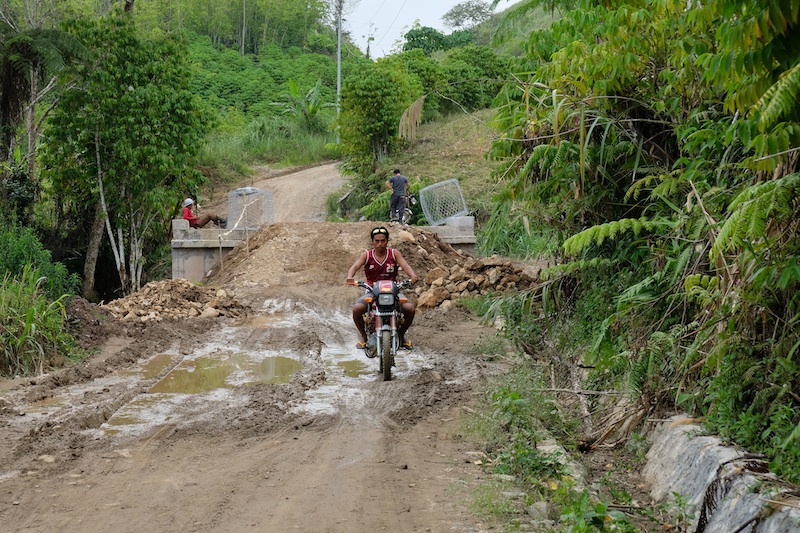 A resident maneuvers the drit road passing a bridge under construction at the Tampakan project area on January 16, 2020 in Tampakan, South Cotabato. MindaNews photo by BONG S. SARMIENTO
A resident maneuvers the drit road passing a bridge under construction at the Tampakan project area on January 16, 2020 in Tampakan, South Cotabato. MindaNews photo by BONG S. SARMIENTO
He noted the local government and SMI have been hammering out a new “municipal agreement” that would clearly spell out the terms between the two parties, because the “municipal principal agreement (MPA) is no longer in step with the present time,” having been inked over two decades ago.
When the MPA was signed in 1997 between the two parties, Tampakan received P2.75 million per annum from SMI as part of the agreement, data from the Commission on Audit showed.
Just recently, the municipal government and the company agreed to create the “Tampakan Coordinating Team,” which will focus only on concerns involving the Tampakan project, the mayor disclosed.
From Western Mining to SMI
Australian firm Western Mining Corp., which announced the discovery of the Tampakan project in 1994, sold the rights to the mining venture to SMI in a deal approved by the national government in 2001.
The following year, another Australian company, Indophil Resources NL, acquired an interest in the Tampakan project, and together with Mindanao-grown conglomerate Alsons (Alcantara and Sons) Group, resumed active exploration of the project.
Paul Dominguez, Presidential Assistant for Mindanao under the Ramos administration, served as SMI president from 2005 to 2007. Before his appointment as PA for Mindanao in 1992, Dominguez, who is married to an Alcantara, had held top executive positions at Alsons. The incumbent Finance Secretary Carlos Dominguez, is his elder brother.
Subsequently through the exercise of corporate options, foreign firms Xtrata Copper and Glencore Plc became Tampakan project shareholders.
In 2015, Alsons Group gained control of the Tampakan project after the pullout of Glencore in a deal reportedly worth US$290 million, including two other mining assets abroad. The Sy family-led SM Group was eyeing a majority stake at the Tampakan project, according to a report published by the Philippine Daily Inquirer in December 2016.
According to the December 2017 “quick facts” published by the MGB-12 in Koronadal City, SMI’s company structure is “100 percent Filipino” but it did not name the company’s shareholders. (Bong S. Sarmiento / MindaNews)
TOMORROW: Open pit mining
